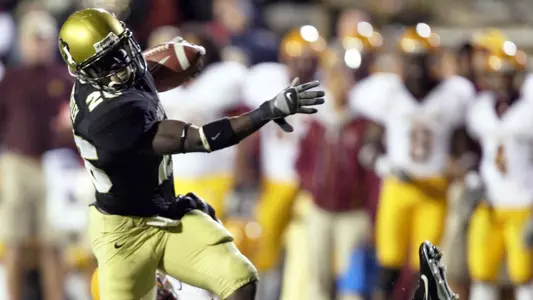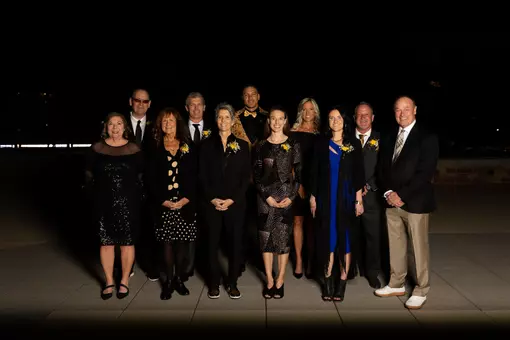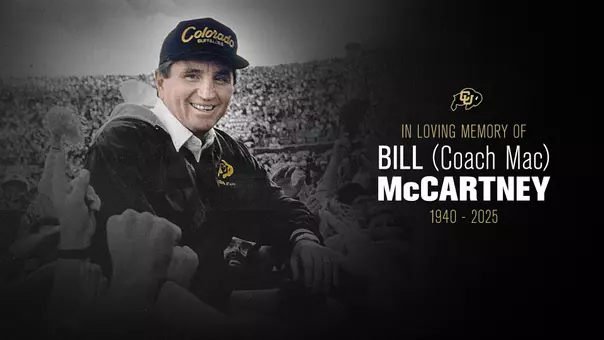Colorado University Athletics

Former Buff Wheatley Now In Business Of Helping Make Game Safer
May 07, 2019 | Alumni C Club, Neill Woelk
BOULDER — Former Colorado standout Terrence Wheatley played the game at the highest level.
Now he's working to help make the game safer.
Wheatley was a star defensive back for the Buffaloes from 2003-07 before becoming a second-round draft pick of the New England Patriots. After five years in the NFL (including a stint with the Jacksonville Jaguars, where his defensive coordinator was current CU head coach Mel Tucker), he worked for the Dallas Cowboys' front office.
But Wheatley recently began working with Prevent Biometrics, a company that has produced what is considered to be a breakthrough in helping identify and reduce head trauma incidents — a mouthguard that produces real-time data on impacts to the head.
"When you talk about former players, it's very much a brotherhood, a fraternity," Wheatley said recently. "A lot of us do our best to give back to the community and give back to the game. For me, this is another way to help with that. Football has obviously taken a little toll on my body — but it also gave me the opportunity to do some pretty cool things in my life. I think it's only fair to me to help make the game safer for those who want to play the game in the future."
Wheatley earlier this spring stopped by the CU campus for some workouts, where the Buffs were testing some of the Prevent Biometrics mouthguards.
"Having a background playing and playing at a high level allows me to communicate with people who aren't as necessarily familiar with the technology," Wheatley said of his role as a field representative for the company. "I can explain to them what it can do and what the purpose is."
The mouthguard, which the company says is more accurate than sensors placed in helmets, is currently being used by a handful of college teams across the nation and is being tested by the NFL as well. The device is fitted with high-tech electronics and a battery, and it provides several different measurements, including linear acceleration — straight-line G-force — as well as rotational acceleration.
"The rotational acceleration, which is rotation of the head, is actually the most important," Wheatley said. "The rotational side is when you see guys get hit on the side of the head and they get a concussion because their head moves so fast and so hard the brain bounces around. That's why the rotational one is so important."
The device also measures the location and direction of every head impact, as well as the number of impacts. The data is transferred directly to an application that can be viewed on a smartphone or table.
"In the course of a game or practice, you can see, for instance, that a player took 'X' number of hits and where on the head he took the hits," Wheatley said. "We can also compute the overall load of that athlete and you can see it in real time. Someone on the sideline can pull it up and get a dashboard of every athlete on the field."
When Wheatley considered going to work for the mouthguard company, he did his due diligence. As a former player, he wanted to make sure the product he was promoting would help players. He said many systems he studied that are built into helmets can provide false readings and are thus not always accurate.
"We're 90-plus percent accurate, both in the lab and out in the field," Wheatley said. "That, to me, said these guys are on the right track."
Also this spring, Colorado tested the Catapult GPS system, which can track a player's movements throughout practice and a game. The wearable device can measure top speed, total distance traveled, acceleration and player "load" (energy expended). That data can help CU's medical staff make sure players work smarter, more efficiently and more safely, and the system can also help prevent injuries — particularly soft-tissue injuries such as hamstring and muscle pulls — by helping identify when players hit peak load.
Colorado, according to Wheatley, is the "first school on the planet" to test both the Catapult and Prevent Biometrics systems at the same time. It is one of the multiple ways CU Athletics is on the cutting edge of student-athlete safety.
The data from the high-tech mouthguards can be used in a variety of ways. It can help medical staff "see" hits that aren't quickly identified, such as when a player is thrown to the ground or when a player may take a knee to the side of the helmet while making a tackle.
The data can also be used as a teaching tool to help players reduce the number of times they take hits to the head by changing and improving technique.
"A lot of concussions, even in practice, might be able to be prevented by better technique," Wheatley said. "We can show players and coaches where they're getting hit and how hard. If you are a guy who likes to go low and cut tackle — like I did — you can be taught to lead with your shoulder a little more and reduce the hits to the head. … The bottom line is you can continue to help a player change technique and still be effective and continue to make the game safer."
Wheatley stressed that there are no products that will actually prevent or automatically detect concussions. But the data the new products provide can help reduce the likelihood of such events by producing better technique and safer practice.
"There is no product on the planet that will prevent a concussion or detect a concussion," he said. "There are a series of tests that will help diagnose a concussion. Our company is another tool in the toolbox to help the decision-making process. We add real-time data to the equation."
And that, Wheatley said, can help make the game safer.
"As a former player, it makes you feel good to help in that regard," he said. "The game is actually pretty safe and we're only going to make it safer with what we can offer. Everybody needs to understand you can't make a violent game non-violent. But there are measures being taken and technology being developed on a regular basis that are making it safer."
Contact: Neill.Woelk@Colorado.edu





